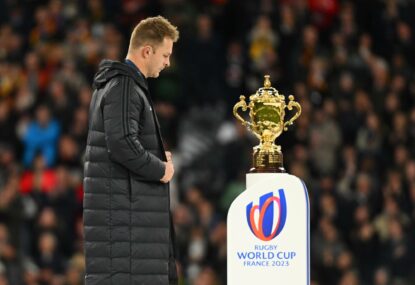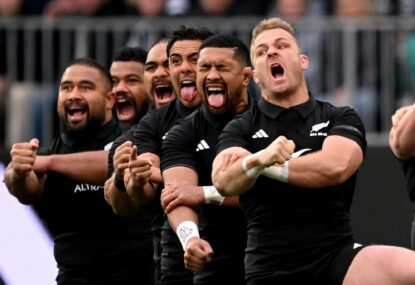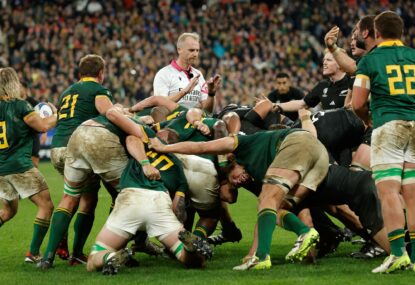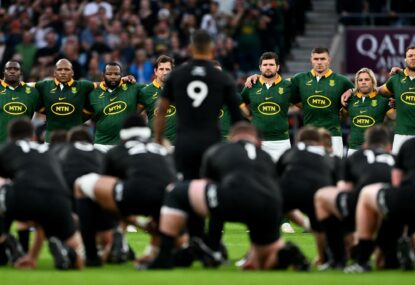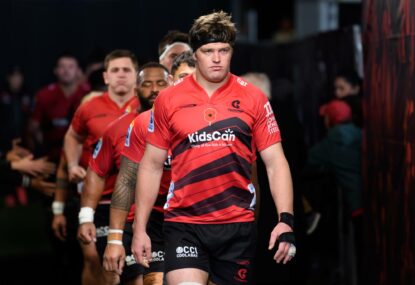As usual, from the outset in Wellington on Saturday night the Springboks tried to upset the All Blacks’ rhythm with jersey-pulling, late charges and sneaky punches. You’d have thought that they’d have learned over the last decade, failing all the while to beat the All Blacks in New Zealand, that these tactics don’t work when the crowd isn’t cheering them.
Butch James was, also as usual, the most blatant if not the worst offender. Within the first ten minutes he had flown headlong at Dan Carter three times either high or late with the obvious intention of fouling him or at least unsettling him. Carter not only proved hard to rattle but responded with some inspired touches and kicking, so the scheme backfired.
James is obviously a whack job, a dangerous thug whose horrendous tackling methods somehow always seem to escape the permanent wrath of the judiciary… perhaps (a) because his team always loses when he offends most often, (b) he seems motivated to offend most often against New Zealand teams, and (c) New Zealand teams don’t tend to bother citing when they win.
If Carter, meanwhile, was ever to mark James again he might as well kick him in the groceries first chance he gets after kick-off, and assume it was self defence.
Bakkies Botha was another with a bad attitude, flying in with late forearm shots on players such as Rodney So’oialo and Ma’a Nonu whenever the referee’s eyes followed the ball, leaving opportunities for late contact.
Brad Thorn had endured enough when Springbok captain John Smit shoved the back of his head after the whistle. He picked him up and thumped him onto the deck, like a buzzcut Kong flipping a Combi van. The humiliation to their captain brought six angry Bokke hurtling instantly to the fray, then All Blacks skipper Rodney So’oialo joined to guarantee an all-in.
From that point on it was pretty much New Zealand’s night. South Africa scored the first try, a surprise Jean de Villiers break putting Bryan Habana away, but it didn’t give the Springboks the lead because Carter had already kicked the All Blacks six points clear and James couldn’t convert. The half-time score was 9-8 to the home side.
The All Blacks scrum and lineout were both solid at this stage, which was doubly important because there was no Richie McCaw to provide ball from turnovers, and in the freezing wet conditions being able to trade such possession for territory was crucial.
Carter in particular did this very well. His territorial kicking was long and accurate, and he eschewed the touchline in favour of pure distance, leaving the Springboks to be the ones kicking for touch and giving most of the lineout throws to New Zealand.
The scrum became more clearly dominant after the break, and with the Springbok backline beginning most set piece attacks flat-footed the All Black midfield defence had an advantage. Aside from the blind side de Villiers breach for Habana’s try there were no more line breaks.
In the second half the All Blacks asserted themselves around the fringes and began to control the game more thoroughly. Few Springboks had energy left for niggle, with the fitter and faster All Blacks beating them by a yard to every breakdown.
Eventually the Africans had to crack, and predictably they did it late in a phase count after their defence had been well and truly exhausted. As Springbok backs and forwards struggled to reassemble some semblance of a defensive line, the All Black backs and forwards were combining seamlessly to send wave after attacking wave crashing into them. Carter finally worked a double round with prop Tony Woodcock then delayed a pass to set Thorn away, and Thorn drew the final tackler to put number eight Jerome Kaino crashing over.
Carter ran proceedings through to the final whistle, making grass-cutting tackles when necessary but most of the time keeping the ball in front of his pack and looking for the next chunks of territory to bite off. Another penalty gave them an unassailable 19-8 lead.
We approached this test wondering if our dam was cracked, whether having already lost Carl Hayman, Chris Jack, Jerry Collins and Aaron Mauger, now suddenly being without McCaw we were vulnerable… even at home, where we have been undefeated since 1999.
But the muscular approach of the past was not necessary. We did not need to do any more than stand up for ourselves, beat them with either pace or fitness, and keep pointing to the scoreboard. The physical tax which men like Hayman and Collins could extract was never other than extra motivation for big, hulking outfits like the Springboks. Those were always the sort of contests they relished and responded well to. It was always our pace of play that upset them most, and under the ELVs this was accentuated.
What’s more, the South African Super 14 franchises struggling with the new laws in 2008 should probably have been seen as a sign that their national side was always going to struggle. I wonder, now that we’ve seen the Springboks look so ill-suited to the new environment, if certain pundits wouldn’t like to revise their predictions of the Wallabies finishing a distant third in the Tri Nations this year.
We also found in So’oialo the perfect leader for this situation. The public will not be able to tell whether or not a captain is a good choice until they find out what the team think of him. The moment where So’oialo unquestioningly waded in to help out Thorn was pivotal. The All Blacks to a man surged to his aid, showing exactly the kind of back-up only good captains get.
Tana Umaga had it too, that follow-me quality… also a Wellingtonian and a dreadlocked Samoan. As we begin our long march to the next World Cup, and must contemplate the possibility of having to play at least occasionally without McCaw, a back-up captain of So’oialo’s type will be a great asset.































































































